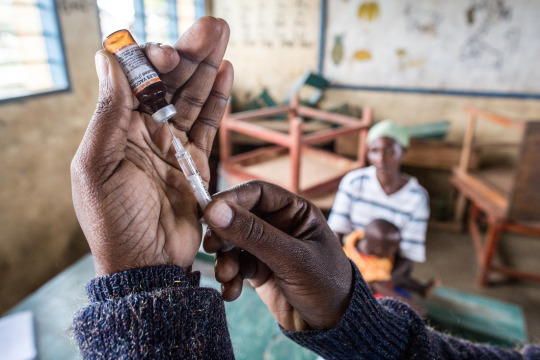
Emily Loud, Gavi, the Vaccine Alliance
“There is a lot to manage to make sure children are vaccinated in Kenya. With hard to reach areas, inadequate transport and high turnover of workers, I used to wonder how we were going to keep everything going.”
In her work as a community nurse, Lucy Wanjiku saw the damage done by preventable diseases, and wanted to do something about it. Now a supply chain manager for Kenya’s immunisation programme, she was one of the first to take part in Strategic Training Executive Programme (STEP), a new learning initiative to train the immunisation leaders that developing countries need. Based on an academic framework of professional competencies for supply chain leaders, the course is hosted at the East African Community Regional Centre of Excellence for Health Supply Chain Management.

Lucy (in the yellow jacket) and her fellow STEP participants. Photo: Gavi/ Moz Siddiqui.
Although the Centre officially launched today, training has already begun. “I really enjoyed this course and the moderators were some of the best I have encountered through my many years in this industry” said Joshua Obel, Operations Director at Kenya Medical Supplies Authority, who participated in an initial session in Kigali last month. “I have been to a lot of trainings during my career…this is the best workshop I have attended and the only one I plan to put into practice.”

Joshua at the first workshop in Kigali. Photo: Gavi/ Moz Siddiqui.
STEP’s real innovation is taking approaches to leadership development from logistics giant, UPS, and adapting them to immunisation supply chains. The adult learning course helps transfer knowledge from private to public sector and has sustainability at its core: in addition to a traditional workshop, course participants are paired up with mentors from the private sector to put their new skills into practice and build a network of contacts to share knowledge.
“We presented a very non-traditional training experience”, said UPS’s Kevin Etter, who designed and developed the project. “I was unsure if this style would work, but it did. Participants were very excited to learn in a new way and then to implement those learnings in their areas of responsibility.” For the private sector too, this partnership is win-win. “Developing a relationship with these leaders through the workshop and mentorship program is invaluable to UPS and other private sector organisations who want to grow their awareness in these regions”, he added.
The Joshuas and Lucys of the developing world are essential for keeping immunisation programs running, yet leadership training for them has not traditionally been part of international support for vaccination. But if all goes to plan, countries like Kenya, Tanzania, Rwanda and Uganda will soon be dealing with higher volumes of vaccines, reaching more children than ever before. To meet this potential, immunisation staff will need a range of skills to manage people, projects and partnerships; the ability to better use data for decision making will also be increasingly relevant. These are exactly the areas in which the Centre of Excellence will be equipping the leaders, warehouse managers and logistics workers who make up East Africa’s vaccination supply chain.

A key challenge for supply chain managers is how to get vaccine cold boxes to children in very remote areas, like this one in Tanzania. Photo: Gavi/ Doune Porter.
In the long term, this model of learning could be the solution developing countries need to help their immunisation systems function sustainably and independently. By partnering with private sector organisations who’ve already encountered and overcome many of the same challenges, key immunisation workers can grow their experience and open up channels for future collaboration and innovation.
Overall, the programme represents an opportunity to build a stronger foundation of expertise for the immunisation systems of East Africa, helping secure the future of protecting children from preventable disease. And that’s got to be a STEP in the right direction.
Project partners include Gavi, the Vaccine Alliance, KfW- the German Development Bank, the Bill and Melinda Gates Foundation, the United Nations’ Children’s Fund UNICEF (National, ESARO and UNICEF Supply Division), World Health Organization, United Nations Population Fund (UNFPA), International Federation of Pharmaceutical Wholesalers (IFPW Foundation), Amerisource Bergen, GlaxoSmithKline (GSK) and United Parcel Services (UPS).









